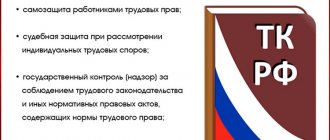Industry agreement concept
The concept of an industry agreement (OS) is contained in Part 1 of Article 45 of the Labor Code of the Russian Federation. This is a legal act that establishes the rules of social and labor relations, the general principles of economic interaction between industry workers. Industry agreements may regulate the following areas:
- Payment order.
- Availability of guarantees.
- Payment of compensation.
- Providing benefits.
- Mutual obligations of the parties.
The basis for the conclusion of the OS was Presidential Decree 212 of November 15, 1991. It obliges the conclusion of agreements between such participants as:
- Government structures.
- Representatives of industry employees (trade unions).
- Employer representatives.
Agreements can regulate the following parties to the labor relationship:
- The procedure for dismissal and the grounds for it.
- Labor regime.
- Rest mode.
- The procedure for obtaining additional education by profession.
- Training.
- Participation of workers in the management of a commercial structure within the framework of social partnership.
- Pension insurance.
The contents of the document, according to Part 1 of Article 46 of the Labor Code of the Russian Federation, are established in accordance with the agreement of all participants. Typically, the OS includes a list of applications. They contain the following points:
- Industry tariff schedules.
- Minimum hourly rates.
- The procedure for issuing allowances and additional payments.
- Procedure for payment of remuneration for length of service.
- List of specialties that require reduced working hours.
- Additional vacation.
The validity period also depends on the agreement, but it cannot exceed 3 years. This limitation is established by part 2 of article 48 of the Labor Code of the Russian Federation. In some cases, based on Part 2 of Article 48 of the Labor Code of the Russian Federation, this period can be extended to three years.
Types of industry agreements
Agreements are divided into types depending on the number of participants who concluded the document. Agreements can be either bilateral or trilateral. Article 45 of the Labor Code of the Russian Federation states that the features of the document are determined by the industry subject to regulation. Let's take a closer look at the types of agreements:
- General. This is an internal act of the enterprise. Federal authorities do not take part in its conclusion.
- Federal. Such a document establishes the general principles of the relationship between employee and employer.
- Interregional. Approves norms at the level of several constituent entities of the Russian Federation.
- Regional. The agreement regulates relations within one subject of the Russian Federation.
- Territorial. The regulatory act establishes the rules of interaction within a particular municipality.
- Other agreements. For example, these could be documents regulating the features of social partnership.
The main difference between the agreements is the levels at which they are adopted.
Cheat sheet for HR specialists: federal industry agreements
"HR service and personnel management of the enterprise", 2009, N 4
Cheat sheet for HR specialists: federal industry agreements
Not all employers remember that, in accordance with Art. 5 of the Labor Code of the Russian Federation, labor relations and other relations directly related to them are also regulated by agreements adopted at different levels of social partnership. However, these agreements impose certain obligations on the employer. Control over their implementation is carried out by the parties to the social partnership, their representatives and the relevant labor authorities (Article 51 of the Labor Code of the Russian Federation). This article provides a list of industry agreements concluded at the federal level of social partnership as of April 1, 2009.
An agreement is a legal act regulating social and labor relations and establishing general principles for regulating related economic relations, concluded between authorized representatives of workers and employers at the federal, interregional, regional, sectoral (intersectoral) and territorial levels of social partnership within their competence. In turn, an industry (inter-industry) agreement establishes general terms of remuneration, guarantees, compensation and benefits for industry workers and can be concluded at any level of social partnership (Article 45 of the Labor Code of the Russian Federation).
The agreement comes into force on the day it is signed by the parties or on the date established by the agreement (Article 48 of the Labor Code of the Russian Federation). The procedure for publishing industry agreements and proposals for accession concluded at the federal level is approved by Order of the Ministry of Health and Social Development of Russia dated April 12, 2007 N 260. In accordance with it, Rostrud, within three calendar days from the date of registration of the agreement (amendments and additions to it), sends its text and information about its registration for publication in the journal “Labor and Insurance” and in the Ministry of Health and Social Development for posting on the official website of the ministry www.minzdravsoc.ru. Then the parties to the agreement have the right to invite the Ministry of Health and Social Development to contact employers operating in the relevant industry with a proposal to join it. In this case, the proposal to join must be published in Rossiyskaya Gazeta.
Employers operating in the relevant industry and who do not wish to join this agreement must, within 30 calendar days from the date of official publication of the proposal to join, submit to the federal executive body responsible for developing state policy and legal regulation in the field of labor, reasoned written refusal. Otherwise, the agreement will be considered extended to these employers from the date of official publication of the proposal to join (Article 48 of the Labor Code of the Russian Federation). In this case, failure to include in the employment contract any rights and obligations of the employee and employer specified in the industry agreement cannot be considered as a refusal to exercise these rights or fulfill these obligations (Article 57 of the Labor Code of the Russian Federation). Please note that in cases where several agreements apply to employees at the same time, the terms of the document that is most favorable for employees are applied (Article 48 of the Labor Code of the Russian Federation).
Table
List of industry agreements concluded
at the federal level of social partnership
as of April 1, 2009
| N p/p | Name of the agreement | Validity period, years | Notification of registration - Letter from Rostrud: date, N (registration: date, N) | Proposal for accession - Letter from the Ministry of Health and Social Development of Russia, date, N |
| 1 | 2 | 3 | 4 | 5 |
| 1 | Industry agreement on transport construction | 2007 — 2009 | dated December 20, 2006 N 4285-TZ (dated December 15, 2006 N 57/07-09) | |
| 2 | Industry agreement on intersectoral industrial railway transport | 2007 — 2009 | dated January 31, 2007 N 331-TZ (dated January 29, 2007 N 58/07-09) | |
| 3 | Industry tariff agreement for organizations of the chemical, petrochemical, biotechnological and chemical-pharmaceutical industries of the Russian Federation | 2007 — 2009 | dated 02/09/2007 N 562-TZ (from 02/07/2007 N 59/07-09) | dated 03/07/2007 N 64-MZ |
| Additions and changes: dated April 19, 2007 N 1832-TZ (dated April 18, 2007 N 67/07-09) | ||||
| 4 | Industry tariff agreement for organizations of the oil refining industry and the petroleum product supply system of the Russian Federation | 2007 — 2009 | dated 02/09/2007 N 563-TZ (from 02/07/2007 N 61/07-09) | dated 03/07/2007 N 65-MZ |
| Additions and changes: dated April 19, 2007 N 1831-TZ (dated April 18, 2007 N 68/07-09) | ||||
| 5 | Federal Industry Agreement on Forestry of the Russian Federation | 2007 — 2009 | dated 20.02.2007 N 869-TZ (dated 15.02.2007 N 60/07-09) | |
| 6 | Industry agreement on organizations of the system of the Ministry of the Russian Federation for Civil Defense, Emergency Situations and Disaster Relief | 2007 — 2009 | dated April 17, 2007 N 1803-TZ (dated April 3, 2007 N 62/07-09) | |
| 7 | Industry agreement on fisheries organizations | 2007 — 2009 | dated April 19, 2007 N 1833-TZ (dated April 16, 2007 N 63/07-09) | dated November 21, 2007 N 349-TG |
| 8 | Industry agreement on territorial bodies and organizations of Rospotrebnadzor | 2007 — 2009 | dated 20.04.2007 N 1862-TZ (dated 19.04.2007 N 64/07-09) | |
| 9 | Federal Industry Agreement on the Coal Industry of the Russian Federation | 2007 — 2009 | dated April 17, 2007 N 1802-TZ (dated April 17, 2007 N 65/07-09) | |
| 10 | Industry tariff agreement of geodesy and cartography of the Russian Federation | 2007 — 2009 | dated 10.05.2007 N 2064-TZ (dated 04.05.2007 N 66/07-09) | |
| 11 | Industry tariff agreement for subsoil use organizations of the Russian Federation | 2007 — 2009 | dated November 19, 2007 N 5244-TZ (dated November 19, 2007 N 74/07-09) | |
| 12 | Industry tariff agreement in Russian civil aviation | 2007 — 2009 | dated 04.12.2007 N 5754-TZ (dated 04.12.2007 N 76/07-09) | |
| 13 | Industry tariff agreement for the machine-building complex of the Russian Federation | 2008 — 2010 | dated 20.02.2008 N 817-TZ (dated 20.02.2008 N 89/08-10) | dated July 24, 2008 N 340-TG |
| Additions and changes: dated 02.10.2009 N 626-TZ (dated 02.10.2009 N 112/08-10) | ||||
| 14 | Industry tariff agreement in the housing and communal services of the Russian Federation | 2008 — 2010 | dated 09/05/2007 N 3586-TZ (from 09/05/2007 N 71/08-10) | dated December 13, 2007 N 389-TG |
| Additions and changes: dated June 18, 2008 N 3174-TZ (dated June 18, 2008 N 101/08-10) | ||||
| 15 | Industry agreement on educational institutions subordinate to the Federal Agency for Railway Transport | 2005 — 2010 | dated June 27, 2005 N 1995-TZ (dated June 20, 2005 N 28/05-07) | |
| Extension agreement: dated 02.26.2008 N 1005-TZ (dated 02.26.2008 N 90/08-10) | ||||
| 16 | Industry agreement on organizations of the oil and gas industries and construction of oil and gas complex facilities of the Russian Federation | 2008 — 2010 | dated December 24, 2007 N 6371-TZ (dated December 24, 2007 N 78/07-09) | dated March 25, 2008 N 118-TG |
| 17 | Industry agreement on organizations of the rocket and space industry of the Russian Federation | 2008 — 2010 | dated 01/23/2008 N 240-TZ (from 01/23/2008 N 80/08-10) | |
| 18 | Industry agreement on bodies, institutions and enterprises of the Federal Penitentiary Service | 2008 — 2010 | dated January 24, 2008 N 257-TZ (dated January 24, 2008 N 81/08-10) | |
| 19 | Industry agreement on organizations of the Federal Archival Agency | 2008 — 2010 | dated 01/23/2008 N 233-TZ (from 01/23/2008 N 82/08-10) | |
| 20 | Industry tariff agreement for organizations and enterprises in the sphere of public services for the population | 2008 — 2010 | dated 18.01.2008 N 144-TZ (dated 18.01.2008 N 83/08-10) | |
| 21 | Industry tariff agreement for the construction and building materials industry of the Russian Federation | 2008 — 2010 | dated December 28, 2007 N 6648-TZ (dated December 28, 2007 N 84/08-10) | dated 04/08/2008 N 144-TG |
| 22 | Industry agreement on the Federal Courts of General Jurisdiction and the Judicial Department system | 2008 — 2010 | dated 02/08/2008 N 534-TZ (from 02/08/2008 N 86/08-10) | |
| 23 | Industry agreement on organizations of the Russian Defense Sports and Technical Organization - ROSTO (DOSAAF) | 2008 — 2010 | dated 26.02.2008 N 999-TZ (dated 26.02.2008 N 87/08-10) | |
| 24 | Industry agreement on customs authorities of the Russian Federation | 2008 — 2010 | dated 26.02.2008 N 1004-TZ (dated 26.02.2008 N 88/08-10) | |
| 25 | Industry agreement on the Federal Security Service of the Russian Federation | 2008 — 2010 | dated 06.03.2008 N 1111-TZ (dated 06.03.2008 N 91/08-10) | |
| 26 | Federal Industry Agreement on the Aviation Industry of the Russian Federation | 2008 — 2010 | dated 03/06/2008 N 1110-TZ (from 03/06/2008 N 92/08-10) | dated June 23, 2008 N 272-TG |
| 27 | Industry agreement on organizations, divisions and bodies of the Federal Migration Service | 2008 — 2010 | dated March 25, 2008 N 1559-TZ (dated March 25, 2008 N 93/08-10) | |
| Amendment: dated June 18, 2008 N 3173-TZ (dated June 18, 2008 N 102/08-10) | ||||
| 28 | Federal Industry Agreement on Automobile and Urban Ground Passenger Transport | 2008 — 2010 | dated March 25, 2008 N 1558-TZ (dated March 25, 2008 N 96/08-10) | dated July 24, 2008 N 338-TG |
| 29 | Industry agreement on organizations of the Federal Agency for Special Construction | 2008 — 2010 | dated 04/09/2008 N 1938-TZ (from 04/09/2008 N 98/08-10) | |
| 30 | Federal Industry Agreement on Road Facilities | 2008 — 2010 | dated 21.05.2008 N 2641-TZ (dated 21.05.2008 N 100/08-10) | dated 08/19/2008 N 6091-TG |
| 31 | Industry agreement on the system of bodies and institutions of the prosecutor's office of the Russian Federation | 2008 — 2010 | dated 07/02/2008 N 3513-TZ (from 07/02/2008 N 103/08-10) | |
| 32 | Industry agreement between the Federation of Trade Unions of Workers and Employees of the Armed Forces of Russia and the Ministry of Defense of the Russian Federation <1> | 2008 — 2010 | dated 12.03.2008 N 1346-TZ (dated 12.03.2008 N 94/08-10) | |
| 33 | All-Russian interindustry agreement on organizations producing nickel and precious metals | 2008 — 2011 | dated December 16, 2008 N 6935-TZ (dated December 16, 2008 N 107/08-11) | |
| 34 | Industry agreement on railway transport organizations | 2009 — 2010 | dated April 22, 2008 N 2083-TZ (dated April 22, 2008 N 99/08-08) | dated July 28, 2008 N 344-TG |
| Agreement on extension, additions and changes: dated January 27, 2009 N 211-TZ (dated January 27, 2009 N 109/09-10) | ||||
| 35 | Industry tariff agreement in the electric power industry of the Russian Federation | 2009 — 2011 | from 07.08.2008 N 4266-TZ (from 07.08.2008 N 104/09-11) | |
| 36 | Industry agreement on organizations of ground urban electric transport of the Russian Federation | 2009 — 2011 | dated November 28, 2008 N 6476-TZ (dated November 28, 2008 N 106/09-11) | |
| 37 | Federal industry agreement between the Ministry of Culture of the Russian Federation and the Russian Trade Union of Cultural Workers <2> | 2009 — 2011 | dated December 29, 2008 N 7155-TZ (dated December 29, 2008 N 108/09-11) | |
| 38 | Industry agreement on the central apparatus and territorial bodies of the Federal Bailiff Service | 2009 — 2011 | dated 29.01.2009 N 289-TZ (dated 29.01.2009 N 110/09-11) | |
| 39 | Federal industry agreement on information technology and communications organizations of the Russian Federation | 2006 — 2011 | dated March 29, 2006 N 839-TZ (dated March 29, 2006 N 49/06-08) | dated July 24, 2008 N 336-TG |
| Agreement on extension, additions and changes: dated 02/09/2009 N 577-TZ (dated 02/09/2009 N 111/09-11) | ||||
| 40 | Industry agreement on bodies and organizations of the Federal State Statistics Service | 2009 — 2011 | dated 10.02.2009 N 627-TZ (dated 10.02.2009 N 113/09-11) | |
| 41 | Federal Industry Agreement on River Transport | 2009 — 2011 | dated 18.02.2009 N 696-TZ (dated 18.02.2009 N 114/09-11) | |
| 42 | Industry agreement on the agro-industrial complex of the Russian Federation | 2009 — 2011 | dated 18.02.2009 N 697-TZ (dated 18.02.2009 N 115/09-11) | |
| 43 | Industry agreement of organizations in the timber industry of the Russian Federation | 2009 — 2011 | dated 02/25/2009 N 778-TZ dated 02/25/2009 N 116/09-11 | |
| 44 | Industry agreement on the timber industry of the Russian Federation | 2009 — 2011 | dated 25.02.2009 N 779-TZ (dated 25.02.2009 N 117/09-11) |
———————————
<1> For civilian personnel working in military command and control bodies, military units and organizations of the Armed Forces.
<2> For employees of organizations and cultural institutions financed from the federal budget.
N. Kiseltsev
Auditor
LLC "Sigma-plus"
Signed for seal
31.03.2009
Features of the development of industry agreements
The procedure for developing documents, regardless of their type, is regulated by Articles 47 and 48 of the Labor Code of the Russian Federation. Before concluding an agreement, you need to draw up a draft of it. The procedure for its development is determined by part 5 of article 47 of the Labor Code of the Russian Federation. The project is formed by a commission. Its provisions are negotiated with the trade union and the employer.
The Commission may notify employers who are not participating in the drafting that work on drafting the agreement has begun. If the organization receives such a notification, it is obliged to notify the trade union about it. This must be done within 30 days. If a written reasoned refusal is not provided in response to the notification, the company is considered to have entered the scope of the OS.
As mentioned earlier, the contents of the document are determined by agreement of the parties. Based on the project, an industry agreement is formed. It comes into force from the moment of affixing the signatures of all participants or from the date indicated in the document.
The maximum term of the agreement, including extension, is 6 years. Extension of validity requires the drawing up of an additional agreement. It must be registered with the Federal Labor Service. The paper is assigned a specific registration number.
IMPORTANT! The conditions set out in the sectoral agreement must not worsen the situation of workers. In the event that several operating systems apply to employees at once, the priority is the document that offers the best conditions for employees.
Publication order
Within seven days from the date of signing the agreement, it must be submitted for notification registration to the Federal Service for Labor and Employment (Part 1 of Article 50 of the Labor Code of the Russian Federation). Then, within three calendar days from the date of registration of the agreement (amendments and additions to it), Rostrud sends its text and registration information to the Ministry of Health and Social Development of the Russian Federation for posting on the official website of the ministry (www.minzdravsoc.ru) and publication in the newspaper “Your Law”. This is stated in paragraph 1 of the Procedure for publishing industry agreements concluded at the federal level and proposals to join the agreement, approved by Order of the Ministry of Health and Social Development of the Russian Federation dated April 12, 2007 N 260 (hereinafter referred to as the Procedure).
Example. Form of proposal to join the agreement
After publication of the document, the parties may invite the Minister of Health and Social Development to contact employers operating in the relevant industry and who did not participate in its conclusion with an offer to join it (clause 2 of the Procedure). The form of the minister's appeal is given in the Example. The proposal must be officially published in Rossiyskaya Gazeta, indicating information about the registration of the agreement and the source of publication (clause 3 of the Procedure).
Who is covered by the industry agreement?
The OS is valid for the following persons:
- Employers who are members of the association that entered into the agreement. If a legal entity leaves the association after execution of the agreement, it is not released from the imposed obligations.
- Employers who asked the association to participate in the conclusion of the OS, but are not included in it.
- State structures and local governments.
- Budgetary organizations on whose behalf the agreement was drawn up.
IMPORTANT! The terms of the agreement apply to all employees who serve the named employers.
Validity of the agreement for the circle of persons
The signed industry agreement applies to:
- all employers who are members of the association that entered into the agreement. Termination of membership in the association after signing the agreement does not relieve the employer from fulfilling it. An employer who joined the association during the period of validity of the agreement is obliged to fulfill the obligations stipulated by the agreement;
- employers who were not part of the association that signed the agreement, but authorized this association on their behalf to participate in collective bargaining and enter into an agreement;
- employers who joined the agreement after its conclusion;
- bodies of state power and local self-government within the limits of their obligations;
- all employees who have an employment relationship with the employers listed above.
This procedure is established by parts 3 and 5 of Article 48 of the Labor Code of the Russian Federation.
If several industry agreements apply to an employee at once, the employer should apply the agreement whose terms are most favorable for the employee (Part 6 of Article 48 of the Labor Code of the Russian Federation).
Situation: is it necessary to make changes to employment contracts with employees after signing an industry agreement? The industry agreement establishes additional payments in favor of employees.
Yes, it is necessary if the organization plans to take such payments into account for tax purposes.
Labor legislation does not oblige the employer to make changes to employment contracts with employees after the organization has been subject to an industry agreement. The provisions of the industry agreement are directly applicable norms that regulate social and labor relations, in particular establishing labor guarantees and benefits for employees (Resolution of the Federal Antimonopoly Service of the Far Eastern District dated August 6, 2003 No. F03-A51/03-2/1775). This means that the employer is obliged to make payments provided for in the industry agreement, regardless of whether corresponding changes have been made to the employment contracts with employees or not.
At the same time, it is necessary to supplement employment contracts with a provision on additional payments so that such payments can be included in labor costs. You can indicate certain conditions in an employment contract in the form of a reference to the norms of the agreement, without specifically deciphering them. This is stated in the letter of the Ministry of Finance of Russia dated March 5, 2005 No. 03-03-01-04/1/99.
Industry agreements and trade unions
The sectoral agreement may specify additional conditions relating to the functioning of trade unions. For example, an employer may be required to make monthly payments to a trade union based on written statements from the employee. Industry agreements may also provide other guarantees to trade unions:
- Providing a trade union member with free time while maintaining his salary to perform public duties.
- Providing time to study in courses and seminars.
- Unhindered visits by the trade union to workplaces to verify compliance with the rights of members of the professional association.
Trade unions, through industry agreements, guarantee:
- respecting the interests of employees;
- providing free consultations;
- provision of legal assistance on labor issues;
- use of trade union property.
IMPORTANT! The regulation of these aspects of labor relations by industry agreements is established by the Law on Trade Unions.
Industry agreement for 2018-2020
The result of negotiations between representatives of the main associations responsible for supporting labor relations in the Russian Federation in 2020 was the signing of the General Agreement for 2018-2020, which regulates relations between workers and employers in various sectors of the Russian economy. The meeting took place between:
- All-Russian Association of Entrepreneurs;
- Government of Russia;
- All-Russian trade union association.
The purpose of this agreement is to improve the welfare of Russian citizens. To achieve the intended goal, the parties assumed the following obligations:
- ensure import substitution by increasing the competitiveness of domestic goods and services;
- pursue antimonopoly policy;
- provide comprehensive support to small businesses;
- coordinate at the legislative level actions aimed at ensuring that workers receive real wages;
- ensure a comparable ratio of the minimum wage to the subsistence level;
- provide increased wages to workers in the Far North.
The General Agreement became the basis for the emergence of industry agreements for 2018-2020.
Let's look at some of them.
Electric power complex
The tariff agreement for 2019-2021 was signed in Moscow between the All-Russian Electric Trade Union and the Energy Employers Association of Russia.
The project was discussed for about six months. As a result of numerous meetings, the parties agreed on the specifics of organizing labor relations and remuneration, on benefits and compensation, on the principles of labor protection, and on ensuring employment in the industry. The agreement managed to include rules governing the gradual increase in wages.
Agro-industrial complex
This agreement was signed between Rosagropromsoyuz, the trade union organization of the agricultural complex and the Ministry of Agriculture in March 2020.
The purpose of this legal act is to support and develop the agro-industrial complex and improve the quality of life in rural areas.
This document regulates the relationship between companies and workers in the agro-industrial complex, terms of payment, provision of benefits, guarantees, rights and obligations of the parties to labor relations.
The agreement is valid for 2018-2020.
Healthcare
The principles of cooperation between medical staff and their employers are reflected in the healthcare industry agreement for 2018-2020. The parties that signed this document:
- Ministry of Health care;
- representatives of the authorities of the constituent entities of the Russian Federation;
- trade union.
The document sets out the main directions for the development of the industry and stimulating wage growth. It is the basis for a collective and labor agreement for medical workers.
Current industry agreements
Today, there are more than 60 industry agreements in force in the Russian Federation. Let's look at some of the industries that are regulated by these regulations:
- Mining and metallurgical complex.
- Coal industry.
- Diamond-diamond complex.
- Road maintenance.
- Oil and gas industry.
- Timber industry complex.
- Agro-industrial complex.
- Production of nickel and precious metals.
- Forestry.
- Railway transport organizations.
- Aviation industry.
- Automobile and urban ground transport.
- Sea transport.
- Educational institutions.
- Shipbuilding industry.
- Subjects that are under the jurisdiction of the Ministry of Education.
- FSB.
- Subjects of the penal system.
- Mechanical engineering complex and others.
Agreements applicable to these industries provide additional rights for employees. That is, the OS is beneficial, first of all, for employees. The document is drawn up taking into account the specifics of the industry.
Responsibility for failure to comply with the norms of the industry agreement
The obligation to fulfill agreements, as well as the liability of the parties and their representatives for failure to fulfill agreements through their fault are provided for in Art. 24 Labor Code of the Russian Federation. Liability for violation or failure to fulfill agreements is established by Art. 5.31 of the Code of Administrative Offenses of the Russian Federation, according to which an administrative fine in the amount of 3,000 to 5,000 rubles may be imposed on the employer or the person representing him.
According to Part 4 of Art. 8 of the Labor Code of the Russian Federation, the norms of local regulatory acts that worsen the situation of workers in comparison with established labor legislation and other regulatory legal acts containing labor law norms, including agreements, are not subject to application. In such cases, labor legislation and other regulatory legal acts containing labor law norms and agreements are applied. Therefore, employers should refrain from adopting local regulations that reduce the protections provided to employees under industry agreements.
When hiring employees, we recommend specifying in the employment contract not only the amount of salary and bonuses, but also additional payments provided for by industry agreements. This is necessary to include payments made in labor costs. This conclusion follows from paragraph 21 of Art. 270 of the Tax Code of the Russian Federation, according to which expenses not taken into account for profit tax purposes include expenses for any types of remuneration provided to management or employees, in addition to remuneration paid on the basis of employment agreements (contracts). The same is stated in the Letter of the Ministry of Finance of Russia dated 03/05/2005 N 03-03-01-04/1/99. Therefore, if an industry agreement was adopted during the period of employment of employees, it is necessary to conclude appropriate additional agreements to the employment contracts.










